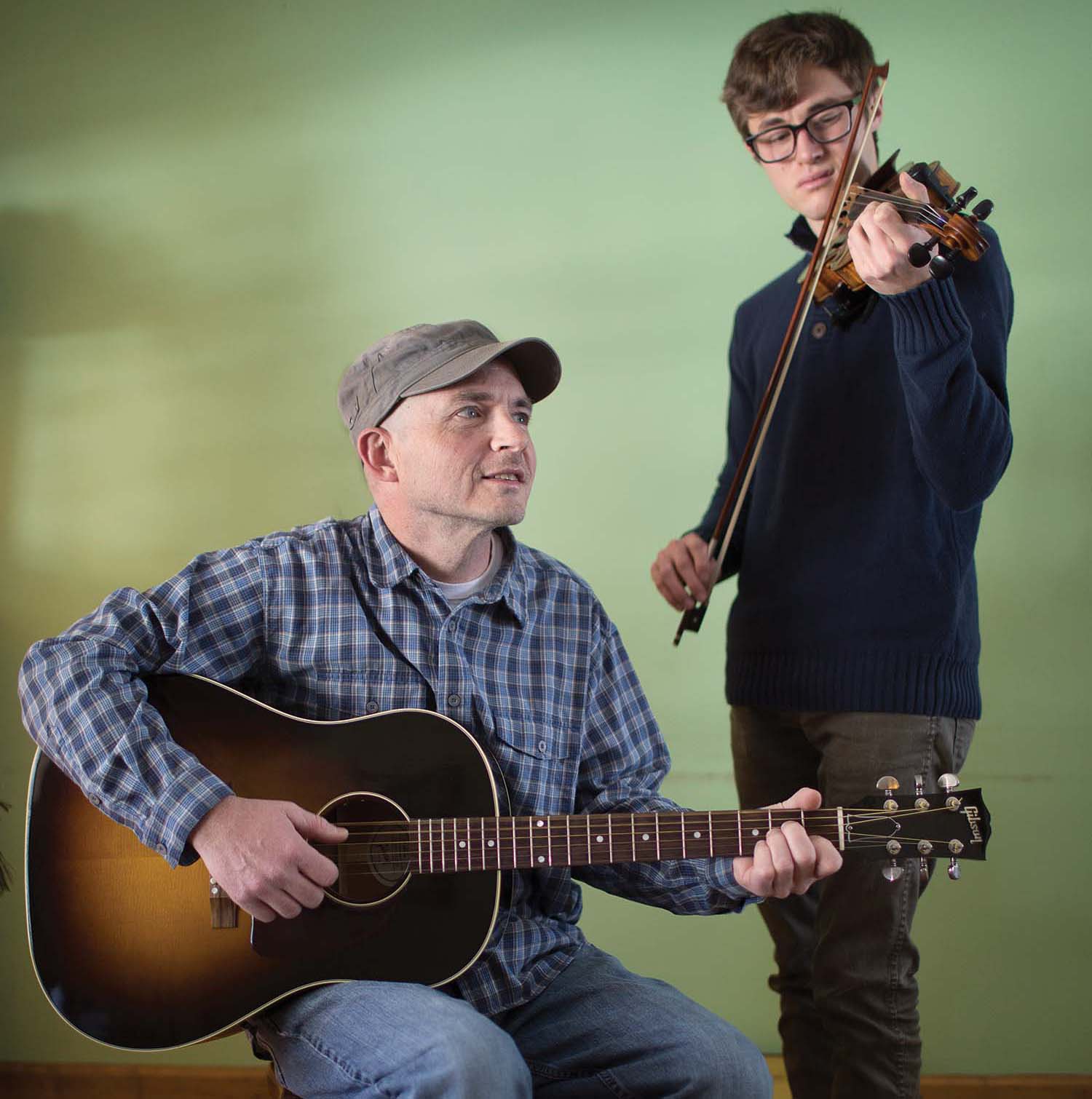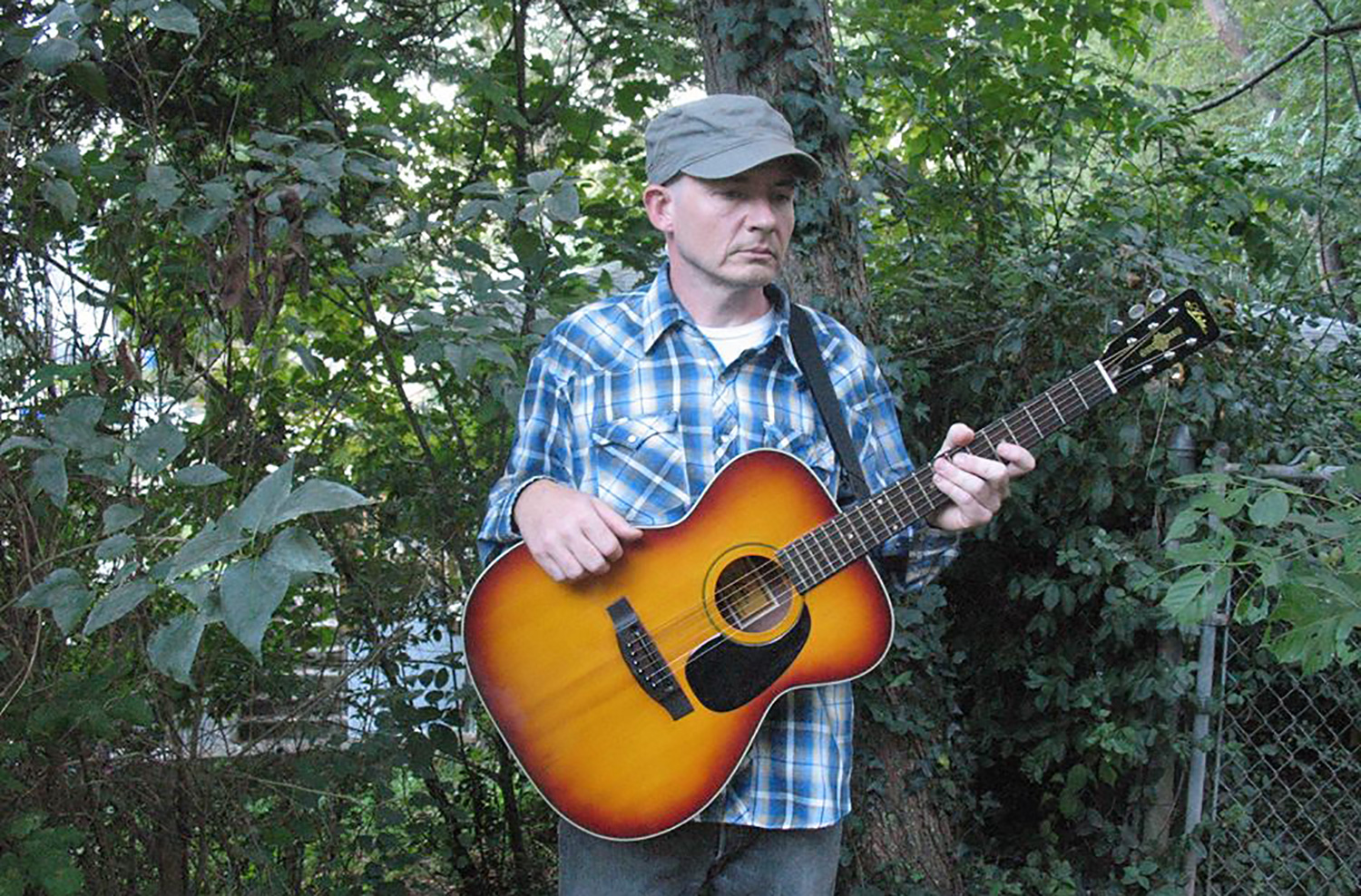
Sparrow and Keith J. Smith are doing something new with centuries-old influences. Photo by Matt Rose
“I like being a bridger of gaps,” says the ruby-lipsticked singer Sparrow, of the Asheville-based acoustic duo/quartet The Resonant Rogues. “I like that we get to introduce people to different styles of music. Someone who is really into old-time music might check us out and be like, ‘Whoa, what is this crazy Middle Eastern stuff? I never knew that I liked that, but I do.’ The same thing with the jazz folks who aren’t as into folk music. That’s a fun and important element to what we do.”
The Resonant Rogues draw influences from several styles, as Sparrow explains. “We love old New Orleans-style jazz, and gypsy jazz, and we’re really into Eastern European traditional music, stuff from the Balkans and north of there, Romania and other places. Even Turkey and the Middle East — we enjoy those scales and the feeling of the music from there.” Traditional mountain music has not escaped their ears, either. “I love the music from this area,” she says. “It seeped into my brain.” (She’s been playing clawhammer banjo for nine years.)
“Going rogue” implies going off road, breaking a new path — and the band’s co-leaders have done that since well before starting the band in 2013. Guitarist/singer Keith J. Smith describes his musical journey: “I was a train-hopper and hitchhiker, and ran into a lot of people that were playing music on the streets,” he says. “My way of life for a long time was as a busker. And a lot of swing music and Balkan music was happening in places like New Orleans, where I was [visiting] quite a bit. I learned a lot from my friends that had more experience.
“These people had already traveled the world, and they’re playing this amazing music that, who knows where they got it from — but it’s really special that they could pass it on to me,” he continues. “When I first left home, I definitely had the wanderlust of wanting to go out and see where life would take me. It really didn’t take very long to figure out, and I’ve pretty much dedicated my life to playing music ever since.”
“The path of ‘Go to school, get a 9-5 job, try and sell stuff’ — that lifestyle that’s set in front of us as the American dream — we, alongside of a lot of our friends, are saying that’s not actually what we want out of life,” Sparrow explains. “And we’re just trying to find another path.”
The couple is making a go at being full-time musicians. “We’re used to a lifestyle of living off of very little money,” she says. “And so we’re able to make a living and take care of basic necessities. But we don’t have expectations of having the same amount of ‘stuff’ that most mainstream Americans have.”
Sparrow grew up in Fort Collins, Colorado, where she developed a love of nature, and of singing harmonies. She performed in several choirs, played the viola, and did musical theater before leaving home at 18. “I was doing social-justice work and environmental activism, and I also couldn’t stay away from music,” she recalls. “I learned to play guitar a little bit, and then I discovered the accordion in New Orleans and fell in love with the instrument. I started listening to Eastern European music, Klezmer, and some French stuff. I’ve also been studying bellydancing, and so I love Middle Eastern and Turkish music.”
Sparrow settled in Asheville in 2004, and met Smith passing through town about three years ago. “We’ve definitely been influenced by the culture of music here, and I really appreciate the history of street music in Asheville, as well. The busking community here is world renowned,” she says, pointing out the YouTube notoriety of performers such as Abby the Spoon Lady and Big Nasty Jazz Band.
Keith and Sparrow developed as street musicians, and will always harbor the soul of the busker lifestyle. “We’re not doing that as much anymore, but it’s a strong part of who we are,” says Sparrow. “And it’s important to me to advocate for it, because there’s always a threat of the public places being more controlled. We’ve managed to fight that and really advocate for street music as an important part of Asheville’s culture.”
Smith was influenced by early American songwriters as a teenager, and as soon as he began learning to play guitar, he began penning originals. “I never wanted to be that typical cover-band guy with the guitar. I wanted to make art,” he says. “We write the lyrics and chords to songs individually, and we we orchestrate them together. We also get input from our fiddle player Drayton [Aldridge] and upright bassist Craig [Sandberg]. They have a lot of good ideas, and we leave space for them to put their print on the songs, too.”
Like any band playing original music, and like any folk musicians of any part of the world, ancient to modern, the Resonant Rogues’ songs reflect life’s daily joys and struggles. But the duo also expresses their local flavor — their Asheville, if you will — in their activism.
“There’s a deep meaning to love songs and to dealing with our own stuff that we go through — demons like that. But I do really like music that talks about the world around us,” says Sparrow.
The Rogues are collaborating with a multinational collective called Country For Syria — started by musicians from the city of Lattakia who identify with the emotions in classic American country songs, played “with an Arabic twist.” Titling their debut album after their global travels, the Asheville band recorded Here & Gone Again at Echo Mountain late in 2014. They spent most of 2015 on the road, here and abroad. This year, they plan to stay a little closer to home.
“I’m going to have a garden this year,” Sparrow insists. “I need some time for songwriting and family, and time to get my hands in the dirt. It’s giving us the opportunity to delve deeper into the kinds of music that inspire us, instead of just being on the road playing our songs six days a week. You can’t have all that output without some good input time.”
The Resonant Rogues perform as a four-piece at Black Bear Coffee (318 N. Main Street in Hendersonville) on Friday, March 25, at 7pm. Free. 828-692-6333. See blackbear.coffee or www.theresonantrogues.com for details.


